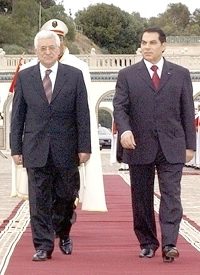
Condemned by U.S. officials as dangerous and by Republican leader Sarah Palin as “anti-American,” Wikileaks has facilitated the destruction of Tunisia’s tyrannical state with the whistleblower website’s release of classified information about rampant corruption in the north African government. The 23-year reign of corrupt President Zine el-Abidine Ben Ali ended January 15, when Ben Ali and his family fled to Saudi Arabia.
Release of U.S. embassy cables back in November on Wikileaks included a number of cables from the U.S. embassy in Tunis calling President Zine el-Abidine Ben Ali and his ruling clique a “quasi-mafia” that ruled with corruption that had spread like a “a dangerous cancer.” The cables contained numerous specific examples of outright theft by the ruling family.
The cables spread throughout the Internet, and into Tunisia, copied and commented on by local bloggers, Facebook members and on tweets. Wikileaks even inspired a Tunisian copycat organization, Tunileaks, which focuses upon Tunisian corruption and highlighted the U.S. embassy cables describing the Ben Ali government.
The New York Times explained that this Wikileaks triumph presents an “awkward dilemma the WikiLeaks cables have posed for the [Obama] administration,” which has strongly condemned the whistleblower organization. The Obama administration has gone into damage control mode, claiming that the Internet — and especially Wikileaks — had nothing to do with the Tunisian revolution. “No one I spoke to in Tunis today mentioned twitter, facebook or wikileaks. It’s all about unemployment, corruption, oppression,” U.S. State Department spokesperson P.J. Crowley tweeted January 16. He added the next day that “Tunisia is not a Wiki revolution. The Tunisian people knew about corruption long ago. They alone are the catalysts of this unfolding drama.”
Of course, it’s true that the Tunisian people have long known their government was corrupt. But Crowley fails to explain why the revolution happened now, rather than long ago. Until the advent of the Internet — and Wikileaks — the Tunisian people lacked the specifics about government corruption and (more importantly) had been denied the knowledge that most of their countrymen were equally disgusted with the corruption and the inability to organize. Only with the publication of the Wikileaks data, combined with the blogs, tweets and Facebook networking, was the government brought down. This, of course, explains why Ben Ali’s Tunisian tyranny tried to stunt the government by censoring the Internet and arresting journalists and bloggers in the days leading up to his ouster.
The Tunisian tyranny is not the first corrupt government brought down by Wikileaks exposure. Back in 2007, Wikileaks released documentation of corruption in Kenyan President Mwai Kibaki’s government just prior to the elections, and arguably influenced the results toward opposition candidates and forced a post-election coalition government.
Photo: Palestinian President Mahmoud Abbas, left, and Tunisian President Zine El-Abidine Ben Ali review troops prior their second round of talks, in Tunis, May 31, 2006: AP Images



